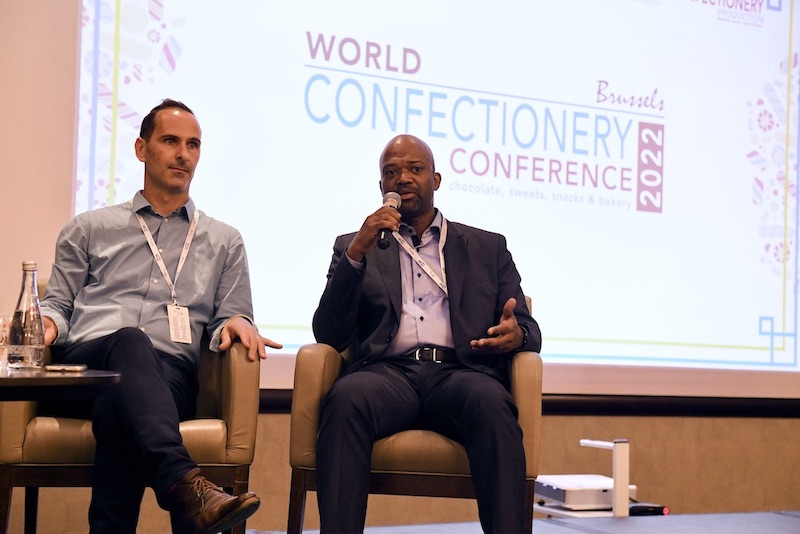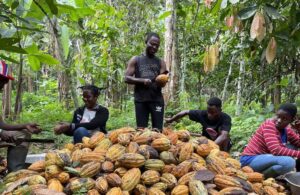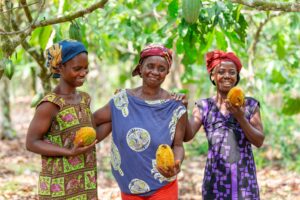Behind the scenes: Driving cocoa sustainability in West Africa

Among core topics for this year’s World Confectionery Conference was the key issue of sustainability as it relates to core cocoa supply chains. Editor Neill Barston speaks exclusively to Alex Assanvo, executive secretary of the Ivory Coast and Ghana Cocoa Initiative on tackling major sector issues
“Some farmers are now being faced with a choice between paying for fertiliser and whether to send their children to school,” explains Alex Assanvo, the recently appointed executive secretary of the Ivory Coast and Ghana Cocoa Initiative.
The former Mars director of corporate affairs, who was appointed to his latest role supporting the sector last year, expresses his major concerns in relaying the harsh realities that many within agricultural communities in his home region of West Africa are now confronted with.
Even before the pandemic, cocoa farmers in Ghana and Ivory Coast were recognised as being among some of the lowest paid in the world, earning in some cases less than $1 a day – significantly below UN-defined world poverty levels.

As Confectionery Production has previously reported, pressures on farming communities operating in the region have intensified- with the likes of campaign group Mighty Earth revealing that a key problem of deforestation within the region persists, as well as a key fact 1.5 million minors remain vulnerable to child labour.
By all accounts, conditions on the ground have not improved in the past two pandemic-hit years. It has seen regional governments combine to introduce the
much-anticipated Living Income Differential payment of $400 per tonne of cocoa. While this was met with general praise from the sector, further weakening of prices and some companies’ apparent willingness to get around the payment in buying advanced stocks of cocoa on the ICE commodity markets, have created stalemate. So, it is with this in mind that Assanvo, who himself hails from Ivory Coast, joined the newly-created cocoa initiative that is aiming to deliver a better deal for farmers, against a backdrop of considerable challenges facing the global industry. “Everyone is clear that the sector needs to do more to help, as farmers are still poor,” he asserts, explaining that it is through collective action that breakthroughs will be achieved.
However, from the ongoing impact of the Covid-19 pandemic, spiralling costs for essential goods including fertilisers, as well as uncertain economic conditions, lead to a continued weakening of cocoa prices.
Notably, the challenges for the recently elected secretary are numerous, but it’s a position he is clearly embracing. “It’s a very interesting role, with Ghana and Ivory Coast producing 60 per cent of the global production of cocoa, so the idea is for the countries to come together in working on market strategies, research, and focus on local consumption of products.
“The two countries have realised that they have been too reliant on cocoa exports, so the idea is to look at the cocoa of tomorrow – with sustainability being one of the key topics,” explains Assanvo, who concedes that there are indeed tests in bringing together nations in a bid to form a consensus on core issues surrounding the future direction of the vital agricultural sector within the region. “It’s proving an interesting journey. Though there are challenges in getting two massive countries together, that’s also part of the excitement. In being from Ivory Coast myself, these are places that I’m very close to, so I feel very blessed to be in this role, linking me to the industry and its partners,” notes the secretary.
Industry track record
He says that one of his earliest roles in the sector came in working for Cadbury in Ghana, offering a particularly strong understanding of increasingly complex conditions within the region. Throughout his career to date, he has engaged with sustainability objectives, engaging with a wide range of NGO’s ranging from Oxfam and Greenpeace, through to the United Nations.
Furthermore, he has also gained key experience working for Fairtrade within the region, specialising in the cocoa sector, which has afforded him further insight into the wider requirements for agricultural communities in trying to forge a sustainable future for their industry.

“There are a lot of things that need to change – everyone needs to think on this issue. We know that transparency is required, we know sustainability is a massive need in the market, but also, we are farmer centric, so we are looking at the price mechanism that reflects our ambition to create more value for them. “We have been hearing so many times that the price of cocoa alone won’t solve the problems – but price is the starting point. If there is no reward, how are we going to ensure that people are going to be incentivised to do the right thing?
“Most of the issues that we see in sustainability are mostly consequences of poverty, so price needs to be that starting point,” reveals Assanvo, noting that other key areas of focus within the sector now including child labour monitoring, looking at traceability of supply chains, as well as reforestation programmes are all valid measures, yet in themselves do not solve the underlying major issue of poverty.
Child labour issues
On the crucial matter of child labour he says that ‘so long as poverty is being amplified, it’s difficult to say this is getting better,” noting that it is in fact systemic change through altering the core mechanism in which cocoa is produced and sold that will be central to achieving the overall goals of the sector in delivering a sector that will be truly fit for the future. While he concedes that there is indeed a considerable road ahead for driving further impact on the sector, he remains optimistic that organisations such as his, are, and will continue to be a positive force in helping delivering change to these farming communities at the heart of the industry



